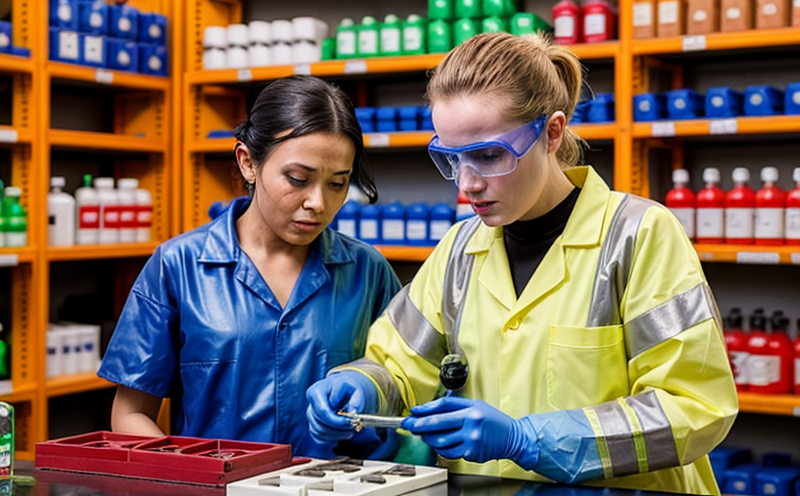IEC 62321 RoHS Hazardous Substance Testing in Imported Products
The IEC standard, IEC 62321, sets forth the requirements for restricting hazardous substances (RoHS) in electronic and electrical equipment. This service focuses on ensuring imported products comply with these stringent regulations to facilitate trade across borders.
The RoHS directive aims to protect public health and the environment by reducing exposure to hazardous materials such as lead, mercury, cadmium, hexavalent chromium, polybrominated biphenyls (PBB), and polybrominated diphenyl ethers (PBDE). For importers and manufacturers, non-compliance can result in severe penalties, including fines, product recalls, and reputational damage.
Our laboratory adheres to the latest versions of IEC 62321 and other relevant international standards such as ISO/IEC Guide 43-1. Our team of experts uses state-of-the-art instrumentation to analyze imported products, ensuring accurate and reliable results that meet regulatory requirements. We offer comprehensive testing for a wide range of materials, including printed circuit boards, casings, connectors, and other components.
Our service is tailored to address the unique challenges faced by importers in different regions. For instance, some countries have their own regulations based on RoHS principles but with variations that can complicate compliance efforts. We help our clients navigate these complexities by providing a single point of contact for all testing needs related to IEC 62321.
The process begins with careful specimen preparation, ensuring the integrity and representativeness of the samples. Our technicians use precision instruments like inductively coupled plasma optical emission spectrometry (ICP-OES) and atomic absorption spectroscopy (AAS) for precise quantification of hazardous substances. We also employ gas chromatography-mass spectrometry (GC-MS) to detect trace levels of organic solvents.
After thorough analysis, we generate detailed reports that include a comprehensive breakdown of detected elements and their respective concentrations. These reports are designed to be easily understood by all stakeholders, including regulatory authorities, procurement teams, and quality assurance personnel. Compliance certificates issued by our laboratory can significantly expedite the importation process and help build trust with customers.
Our commitment to excellence extends beyond just meeting statutory requirements. We continuously invest in research and development to stay ahead of emerging trends in hazardous substance management. By leveraging advanced technologies and methodologies, we ensure that every test conducted adheres to the highest standards of accuracy and reliability.
| Test Item | Methodology | Acceptance Criteria |
|---|---|---|
| Lead (Pb) | Inductively Coupled Plasma Mass Spectrometry (ICP-MS) | <1000 mg/kg for all materials |
| Cadmium (Cd) | Flame Atomic Absorption Spectrophotometry (FAAS) | <100 mg/kg in electrical and electronic equipment |
| Mercury (Hg) | GC-MS | <100 mg/kg for all materials |
In summary, our IEC 62321 RoHS hazardous substance testing service offers a robust solution for importers seeking to ensure compliance with international standards. By partnering with us, you can confidently navigate the complexities of global trade and maintain your organization’s reputation for high ethical standards.
Scope and Methodology
The scope of our IEC 62321 RoHS hazardous substance testing service encompasses a comprehensive set of analyses aimed at detecting prohibited substances in imported electronic and electrical products. The primary focus is on ensuring compliance with the latest versions of the standard as well as relevant national regulations.
- Comprehensive Analysis: Our laboratory performs tests for a broad spectrum of hazardous materials, including lead (Pb), cadmium (Cd), mercury (Hg), hexavalent chromium (CrVI), PBB, and PBDE.
- Advanced Instrumentation: We utilize cutting-edge technology such as ICP-OES, AAS, and GC-MS to achieve precise measurements of trace elements down to parts per million levels.
- Sample Preparation: Rigorous specimen preparation ensures accurate representation of the materials being tested. This includes cleaning procedures, sampling techniques, and homogenization processes.
The methodology we employ for IEC 62321 compliance testing involves several key steps:
- Preparation of Specimens: Samples are carefully selected based on their intended use in the product. This step ensures that the test reflects real-world conditions.
- Extraction and Purification: Extractants and solvents are chosen according to the specific type of material being tested. This process is crucial for removing interfering substances and providing clean samples for analysis.
- Analytical Techniques: A combination of ICP-OES, FAAS, and GC-MS is used depending on the nature of the substance detected. Each technique offers unique advantages in terms of sensitivity and specificity.
The acceptance criteria established by IEC 62321 are strictly adhered to during our testing process. For example, lead should not exceed 1000 mg/kg for all materials except those specifically exempted under the standard. Cadmium levels in electrical and electronic equipment must be below 100 mg/kg. Mercury concentrations similarly need to stay below specified limits.
Eurolab Advantages
At Eurolab, we pride ourselves on delivering unparalleled quality and reliability across all our services. When it comes to IEC 62321 RoHS hazardous substance testing for imported products, our clients benefit from several key advantages:
- Expertise in International Standards: Our team comprises highly skilled professionals who are well-versed in both the latest versions of IEC 62321 and other pertinent international standards.
- State-of-the-Art Facilities: Equipped with top-tier laboratories, we provide an environment conducive to accurate and precise testing results.
- Rapid Turnaround Times: Our efficient workflow ensures that your products receive timely analysis without compromising on the quality of service.
- Detailed Reporting: Comprehensive reports are prepared for each test conducted, providing clear insights into the findings and recommendations for compliance.
- Compliance Certificates: Upon successful completion of testing, clients receive official certificates recognizing their adherence to IEC 62321 requirements. These documents facilitate smoother importation processes and enhance customer confidence.
In addition to these core benefits, Eurolab also offers additional value-added services such as training sessions for your staff members and assistance with navigating complex regulatory landscapes. Our goal is not just to meet but exceed expectations, ensuring that every client leaves satisfied knowing they have received best-in-class service from a reputable partner.





